Newsletter
Newsletter May
May is here!
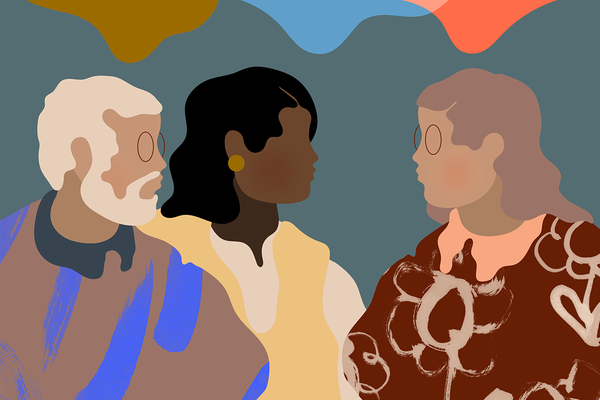
Valborg has passed and spring has finally arrived! The research program has not rested, despite the cold weather. After an intensive March with both the Uppsala International Literature Festival and the start-up of the Committee for the Voices of Democracy, we have worked intensively in April and May on the evaluation of the program initiated by the domain board. In early May, we welcomed the panel for a site visit, and in early June we expect to receive feedback on this. As part of the self-evaluation process, we sent out a survey among the program's researchers, and we received a very good response and many wise contributions and suggestions for us to work with. Thank you for that! In early autumn, we will develop a plan for the program's coming years, and the board has therefore decided that no new call for research support will open during this summer/autumn. Instead, we await the evaluation and the strategic work that is now underway, and we aim for new calls for 2025.
The results of the spring call are now on the website, where you can see three individual projects and three group projects as additions to the program's activities. We welcome Adam Hjorthén, Jesper Olsson, and Erika Forsberg to us, as well as Li Bennich-Björkman, Johan Wejryd, and Otto Fischer and their respective project colleagues to the group. We look forward to lots of exciting research and important discussions! Don't miss reading about their exciting projects, at www.uu.se/dohu.
Higher education issues have once again been in focus for public debate, not least sparked by the Minister of Education's statement on the expansion of independent courses that are said to compete with “quality of the education that society needs most”, primarily engineering education (SvD 2024-04-09). The responses were not long in coming, and Vice-Chancellor Anders Hagfeldt together with Lund's Vice-Chancellor Erik Renström (SvD 2024-04-11) commented on shortcomings in the reasoning and the general problem of the hollowing out of higher education funding. Also the Swedish Students' Union's Jakob Färnert (SvD 2024-04-10) replied, showing that the number of independent courses at the country's universities, contrary to the minister’s claim, has clearly decreased over the past decade. Once again, questions about the political governance of higher education, about academic freedom, and about the basic conditions for higher education in society, are thus again put on the table.
To add substance to this more general debate, the program will participate in no less than three seminars at this year's Almedals week. Together with HumTank, the program will discuss the question “Science for all - how does democratic knowledge transfer work?” on Tuesday, June 25. Participants from the program include Adam Hjortén, Department of English. On Wednesday, Uppsala University will organise a discussion on the theme “Higher studies - for whose sake?” which is about the aims and objectives of higher education, and its role in a democratic society. Vice-rector Tora Holmberg is arranging and will participate in the discussion, and Linda Wedlin will moderate. Later on Wednesday, Dag Blanck, among others, will participate in a discussion on “The Super Election Year 2024 - What insights does humanistic analysis provide on political choices and election outcomes?”. This seminar is also co-organised with HumTank.
We are now entering the final sprint for the spring semester! For the autumn, I would like to remind you of the opportunity to contact us if you have suggestions for themes, guest lecturers, workshops or anything else that you would be interested in doing within the framework of the program. Please email dohu@uu.se.
/Linda and colleagues
February 2024: New year, new opportunities
While we are heading into the sports holiday season, although with pouring rain outside my window, it is time to give an update on the program and to took towards the spring. The applications received in the spring call are now under review, and we look forward to welcoming new researchers and research teams to the program. These will be announced at the end of March. Meanwhile, the first group of researchers admitted to the program has finished their projects and can now begin to present exciting results for us! Stay tuned for updates on the website on the lessons learned and knowledge gained from these projects.
As the program enters its third year, we will be develop and consolidate our activities. As part of this, we have invested in support for research groups in one of the calls. One or two new groups will be funded, and we look forward to working with them. During the year, we will work more actively to thematise research and create new ways for the university's researchers to meet for multi- and interdisciplinary conversations, and to discuss opportunities for external research applications in various constellations. If you have ideas or suggestions on what the program can do to support such work, do not hesitate to contact us to discuss! As usual, you are still welcome with ideas and suggestions for activities, seminars or writing projects of relevance to the program's theme.
One of the themes for this spring will be free speech and democracy. We will soon be participating in the Uppsala International Literature Festival, and will be hosting the Israeli author and journalist Gideon Levy. He has been called Israel's most hated man, but has continued to repeat his criticism of Israel in both books and newspaper columns. He speaks with Kholod Saghir and Mikael Olsson Al Safandi under the title "An Israeli patriot's perspective on the fate of Palestinians". Information and registration here. Don't miss it!
Earlier the same afternoon, and in the same room, the program will host the first meeting of the Committee for “Demokratins Röstbärare”, a newly launched platform for the exchange of ideas and discussion on threats and hatred directed at cultural practitioners, journalists and academics. The committee is an association of organisations that want to work together to maintain and develop the democratic space for these groups, and the work on the platform has been coordinated by the Swedish UNESCO Council. The meeting in Uppsala is the start of this collaboration, which includes SUHF and the Young Academy of Sweden among others.
This spring we will have another author visit, this time the award-winning Nicaraguan writer Sergio Ramírez. With the overall title "Literature - resistance to oppression and a source of hope", he will talk about his experiences as a writer in Nicaragua, now in exile in Spain, about democracy in his former home country and beyond. On May 15, at 16-18 in the Humanist Theatre, he will talk with Fernando Bermúdez, Uppsala University, and Oscar García, University of Gothenburg, among others, about academic freedom and democracy.
We would also like to take this opportunity to remind you of the spring research meeting that will be held on June 3. More information to come.
For now, we wish everyone a fast-paced and fun sports holiday!
December 2023: Academic freedom and the right to science
.jpeg)
Listen to SCAS TALKS podcast for som highlights from the week under the title "A week on Academic Freedom", 23-27 October
We now summarise another semester of exciting and important activities! Our major initiative during the fall, A Week on Academic Freedom, was a great success and has been recognised in the Swedish higher education community. The issue is highly topical, and involves higher education management, researchers and decision-makers in various contexts, also internationally as work is underway within the EU to legally strengthen the protection of academic freedom throughout Europe. The week began with interesting reflections both from the current European discussion and from ongoing discussions in the United States, where academic freedom in relation to teaching and learning, in particular, is currently burning. With the help of wise input from members of our advisory board - Farshid Jalalvand, Linn Svärd, Göran Rosenberg, Astrid Söderberg Widding and Johan Östling - and our researcher Annika Nilsson, we also learned more about the conditions for knowledge production in Sweden today and the various demands placed on a university with a democratic mission.
The rest of the week offered exciting discussions about topics as diverse as the relationship between science and society in different scientific disciplines, about how trust in science is changing and what can be done about it, about the status of Swedish academic freedom and how it can be better protected, about academic integrity and how it is changing, and about collegiality as a form of governance and its relationship to academic freedom and responsibility. If you missed our activities during the week, you can listen to SCAS TALKS podcast for som highlights from the week. We can conclude that the topic of academic freedom is still highly relevant and far from exhausted, and we can already look forward to a similar week on this theme in spring 2025.
We ended the semester with a program research day on the 19th, with article discussions on universities as sites of student rebellion and political activism, as well as discussions on collegiality and governance in Swedish universities. In the afternoon, Samantha Besson, from College de France, gave a very interesting lecture on how we can understand the idea of science as a fundamental human right, and what implications this has for the organisation and regulation of science.
We would like to take this opportunity to thank all of our researchers, participants, listeners, reviewers, collaborators, and guests for this autumn's work and discussions, and we look forward to continue working with you in the new year!
Let us, finally, remind you of the two open calls - one individual and one for groups which close on the last day of January.
Happy Holidays and a Happy New Year to you all!
September 2023: Time flies
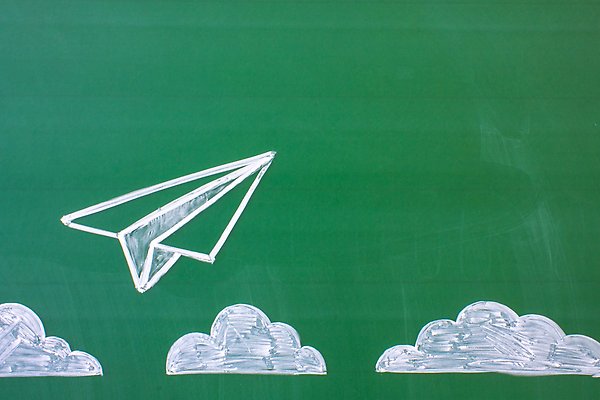
October 23-27, under the title "A week on Academic Freedom", a series of activities and events will be held on issues related to academic freedom. Photo: Getty Images
Time’s flying, and now we have managed both the start of the semester and the autumn's first research meeting for the program. The latter, held on September 7, offered many interesting conversations, and we saw great potential in the opportunity to discuss and ventilate both small and large issues of relevance to both individual projects and to the program. Among other things, questions about outreach, collaborations and different ways to involve more people in our research were discussed, a theme that we will return to later in the fall. During the afternoon we also heard Professor Ruth Bush talk about her project "The creative lives of African Universities" and she generously shared her experiences from studying and working with African universities and researchers with us. This also provided many interesting perspectives and insights for several of our ongoing projects, and many of the discussions initiated during her talk were also continued in the panel discussion held the following day. Overall, we are very inspired and happy about the engagement in the program during these two days, and we can’t wait for the next research meeting, on December 19. Besides continuing the conversations starter, we will hear professor Samantha Besson speak on "The human right to participate in Science". Reserve the day in your calendar!
Before we get to that point, however, we have another major event to look forward to: an entire week on academic freedom. On October 23-27, under the title "A week on Academic Freedom", a series of activities and events will be held on issues related to academic freedom, both in a national and an international context. The research program Democracy and Higher Education is responsible for the opening day, Monday 23 October. Among other things, you will hear presentations on the threats to free education in the United States, and on the work to strengthen and secure academic freedom in Europe. In addition, a panel discussion on the Swedish conditions for free dissemination of knowledge in a world of both increased demands and increased pressure on universities and their researchers. The week is a collaboration between Democracy and Higher Education, the research center HERO, and the Swedish Collegium for Advanced Study (SCAS). Please spread the invitation and program for the entire week in your respective channels so that we can get many people involved in the discussions on this important, and topical, theme!
Another piece of news worth noting is that the program will soon issue a new call for proposals for the spring. This time it is a call for research groups, with the possibility to apply for funding for groups of 2 to 4 researchers. The main applicant must have an employment within HumSam, UU. More about conditions and application procedures will be on the website shortly, so keep your eyes open!
June 2023: Sunny summertime
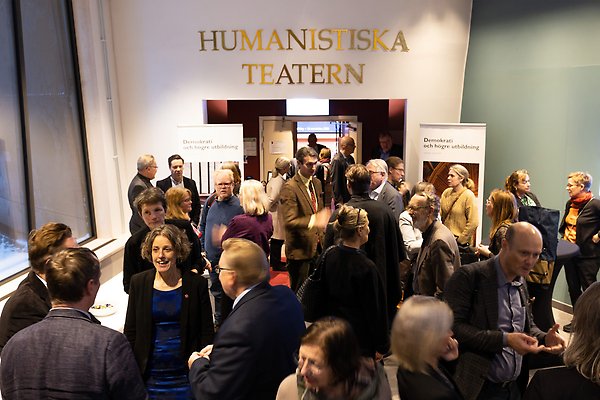
"One of the clearest milestones of the year must also be considered to be our very successful inauguration in November, where, despite the snowstorm and train chaos, we attracted a large and very committed crowd to discuss the role of universities in democracy" Photo: Mikael Wallerstedt
So, in this lovely summer heat, we are now entering the final sprint before summer holidays. The academic year with Democracy and Higher Education has undoubtedly gone fast, but we have also managed to accomplish a lot! Among some of the highlights we can count the symposium on student revolts and on the university as a place for social movements that began in the autumn, with guest Rod Ferguson as the main speaker; the half-day symposium on experts and the role of experts in democracy that we held in connection with Sweden's presidency of the EU; and the full day on university pedagogy for a sustainable and democratic society that we arranged together with the unit for educational development this spring. The program has also on several occasions discussed the role of literature and art in democracy, not least through our participation in the Uppsala International Literature Festival. One of the clearest milestones of the year must also be considered to be our very successful inauguration in November, where, despite the snowstorm and train chaos, we attracted a large and very committed crowd to discuss the role of universities in democracy. I would like to take this opportunity to extend a very big and heartfelt thank you to everyone who arranged, commented, participated and engaged in the programme's activities during the year!
During the year, it has also been particularly enjoyable to welcome the researchers to the programme who have received funding through one of our three open calls. There are incredibly exciting and relevant projects that are now both ongoing and about to begin, as well as some that are about to be completed. In an effort to increase the exchange of knowledge between researchers/research groups and across project and subject boundaries, beginning this autumn we will gather all researchers with ongoing projects twice a semester for programme days where we get a chance to talk about and in relation to ongoing projects. These full days will replace the biweekly seminar series we have held on Tuesdays. The dates for the autumn programme days are September 7 and December 19. In connection with these meetings, we will have two visiting researchers who will each hold an open lecture in the afternoon. On September 7, Ruth Bush will give a lecture on issues she addresses in her book "The Creative Lives of African Universities: Pedagogy of Hope and Despair", and on December 19 we will have Samantha Besson speaking on "The Human Right to Participate in Science and the Legal and Institutional Structure of Science". Therefore, I encourage you all to book these days in your calendars now!
A further innovation for the coming academic year is that, starting in 2024, we will replace one of our two annual calls with a new support form: a support for research groups. The first will open this autumn with a deadline in January 2024, and will be processed in early spring. This call thus replaces the individual support for the spring semester. The call that is now open, with a deadline in August, will not be affected but will be processed as planned in early autumn, and a new call for individual support is planned for August 2024. More information about the new call will come in early autumn. In connection with this, the support form "Nearly-there-funds" will be phased out.
With the invitation to follow our highly interesting seminar in Almedalen next Wednesday morning at 8.00, which you can read about in the UU newsletter, I and the programme management would like to wish you all a really nice summer and a great holiday!
/Linda together with Christina, Dag and Patricia
April/May 2023: The time of blooming flowers is here...
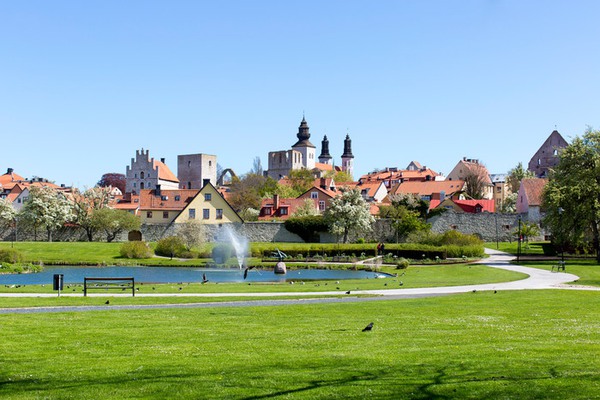
The Almedal park and Visby Cathedral in the background
These are busy times in academia! Not only are we approaching the end of the semester, with things like essay assessments, course completion, and thesis evaluations on the agenda, it is also prime time for PhD thesis defences with all that it entails, and for some even graduation and diploma ceremonies to be managed. And this should be done alongside various student celebrations, school closures and other celebrations that come with the blooming of the flowers outside. And we have just celebrated spring with resurrected last-of-April traditions!
But these are also unusually busy days for those struggling to defend and explain academic values and their importance at a time when challenges seem to be mounting for the independent academy. The other day DN published a letter signed by 2,489 researchers expressing their dissatisfaction with the current application of the Ethics Review Act, which through both bureaucratization and juridification risks making a large amount of social science and humanities research difficult or even impossible to complete. In the past weeks, we have also seen a large number of contributions - from researchers and teachers, university management, student representatives, trade unions and others - that unanimously and clearly criticise the government's decision to shorten the terms of office of the incoming members of the country's university and college boards. Many of us have also visited or spoken at events addressing these issues in relation to the different aspects of academic freedom that they touch upon; research freedom and institutional autonomy.
The outrage from academia on these issues is natural because they concern core areas of academic activity: the professional responsibility to conduct socially relevant and important research without harming people, and the universities' responsibility to promote research and education for the benefit of society based on scientific and collegial principles. In both examples, the criticism for most of us is not about renouncing this responsibility, but about creating the best possible conditions for us as individual researchers, teachers, but also as a collective in colleges and as a university, to take responsibility and live up to the high expectations of research and education put on us. The importance of freedom and the associated responsibilities is emphasised by Vice-Chancellor Anders Hagfeldt in a reply to an editorial in SvD.
One of the expectations on higher education speaks directly to the core of our research program; the responsibility and role of higher education in serving and promoting democratic societies. As part of the program we have only in the few past days initiated discussions on higher education pedagogy and its importance in promoting democratic and sustainable societies, as well as on the tasks and challenges of research councils and how they struggle to cater both to fundamental democratic principles of "primacy of the will of the people" and to professional judgments and values of knowledge and science. For those of you who missed these opportunities for reflection and discussion on core academic practices, we will, of course, provide more opportunities. In the upcoming events we also look beyond the Swedish context for some international perspectives:
On May 23, Johanna Ohlsson will present her study on student organisations, democratisation and higher education in Belarus, and on May 24, we will together with Sinas organise a seminar on the state of democracy and higher education in today's Florida. At the latter, we have two visiting researchers from Florida who can provide both a broader perspective on developments in the United States and specific examples of how democratic developments affect everyday academic life at their own institution. This seminar requires registration, please see more information in the calendar.
On June 15, we will arrange a seminar in Riksdagen about knowledge, democracy and how the democratic discussions are conducted in relation to research, education and learning. Our researcher Christine Ekholst will present her ongoing study "Bara fakta, tack! History as politics online.", and Dag Blanck will follow up with reflections from Florida and the American debate on the "culture wars" experienced in universities and schools where the role of knowledge is central. This seminar is organised by the parliamentary group and is not open to the public, but if you would like to participate, send an email to dohu@uu.se and we try to help you.
On June 28, it is time for this year's Almedalen-seminar, building on the question "Do universities have a voice?" and deals with research communication, collaboration and the role of universities in the democratic debate. Already at 8 am, discussions will be held with, among others, Ulrika Björkstén, science reporter at Swedish Radio and incoming DG for “Vetenskap och Allmänhet”, Tora Holmberg, Vice-Rector for Humanities and Social Sciences at UU, and Johan Rockberg, research policy spokesperson at the Young Academy of Sweden. The seminar will be live-streamed and thus possible to follow from your preferred sun-drenched terrace with morning coffee in hand, if you don’t happen to be in Visby.
And last but not least, are you a young researcher (equivalent to a post-doc) interested in the research program and in research related to democracy and higher education? Do you seek an opportunity to network with other young, and more senior, scholars with similar interests in a multidisciplinary environment? Do you have week 43 (October 23-27, 2023) relatively unbooked in your calendar? Then check the box below to sign up for our networking group.
Don't forget to enjoy the flowers amidst all these activities!
/Linda
March 2023: Knowledge, expertise, and different forms of storytelling
With snow still falling outside it is obviously too early sum up winter, but we can at least say that February and March have offered many exciting seminars and discussions within the program. Last weekend, the program participated for the first time in Uppsala International Literary Festival, with the ambition to contribute to strengthening the understanding of literature and the role of storytelling in a democracy that must be continuously created and maintained. Christina Kullberg spoke about this during the festival opening ceremony at the Stadsteatern Friday evening. In line with this years theme, "War and Reconciliation", the introduction was followed by a glimpse into Maria Engström's research on cultural expressions in Russia, allowing us to learn more about how "neo-Soviet myths" are currently used and disseminated in both art and literature and what significance this has for the understanding of war and democracy in contemporary Russia. This served as an excellent background for the subsequent author discussion between Russian author Sergei Lebedev and Ida Börjel, both of whom have depicted the ongoing war in their books. On Saturday, in the Uppsala Art Museum's premises at the castle, we could hear the researcher Sven Widmalm, the historian and author Ola Larsmo and the poet Burcu Sahin talk about facts, feelings and stories about the Racial Biology Institute in Uppsala and its history, and what lessons we can learn from their respective deep dives into the archives. Surrounded by art work on the theme, this was a very exciting and insightful encounter between different forms of storytelling on difficult, but important, issues with a direct bearing on questions of knowledge and democracy.
Earlier in March, we brought together local and international researchers to discuss democracy and expertise. When is scientific expertise needed in decision-making, do science and politics have different views on knowledge and expertise, and what is an independent expert in a political context? With examples taken from current discussions on the role of scientific expertise during the corona pandemic and the role of the politically independent European Central Bank for the EU, we got good insights into both difficulties and opportunities for a legitimate expert role in today's politics and how this role is sometimes also challenged.
It is with great pleasure that we can now welcome 11 new researchers to the program! This time, a record number of applications, 27, were processed by our six dedicated and competent experts from our various faculties. We are very happy to see so many good and well-developed applications to the program! The next round of applications will open shortly, and will close as usual at the end of August.
Gazing into the future, we have many interesting things coming up. On the theme of literature and democracy, on April 17 we will follow Mary Wollstonecraft to university; about how feminism through Wollstonecraft's writings has been incorporated into and changed higher education. On April 18, we continue the theme of universities but move to Jordan and the question of how universities can contribute to the transformation and development of democracies. Details for both events can be found below. Don't forget to book May 16 in your calendar. There will be a full day on "The role of higher education in democracy and sustainability", with visiting researchers from both the US and New Zealand. The day is co-organised with the Department of Quality Development at the Unit for University Pedagogy, UU. Very welcome!
January 2023: Digitalisation, art and knowledge
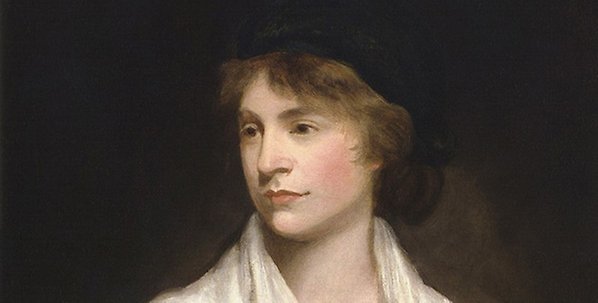
Emma Clery from the department of English will be presenting her work on "Democracy, higher education, and feminism: the case of Mary Wollstonecraft on the 31:st of January. Photo: Mary Wollstonecraft by John Opie
What are in Sweden sometimes called “the Ox weeks” – the long and hard weeks during winter with no public holidays in sight – are here . It would be easy to write about the dreary winter weather and the continuing anxiety about the world around us, including the war, electricity prices, and the current state of our democracy. But today the sun is shining, the beginning-of-semester stress is over, and you can actually begin to sense a new beginning as the days are now quite rapidly starting to lengthen!
The research programme continues unabated. On the 24th of January, the first event of the year was held together with the Department of ABM. The theme was Digitization of Research Data and its Democratic Dilemmas. It was a well-attended and very successful event, leading to many more questions and openings for further discussions. On the theme of digitalisation, current discussions on the role of chatbots in higher education is of course immediately relevant and makes us think about the core of knowledge, about pedagogical practices, and about the value and contribution of science and education in society. Similarly, the related discussion on AI-generated art raises questions about the meaning and value of art and aesthetic values. Perhaps these two spheres of value - education/knowledge and art respectively - can help each other in this precarious situation? This is what Lars Strannegård, rector of the Stockholm School of Economics, suggests in his opinion piece in DN on this theme. Perhaps this should be the theme for a seminar with the research programme in the spring?
Opinion piece, Lars Strannegård in DN: Chattrobotarna är inte kunskapens fiende (in Swedish)
We will learn more about knowledge, education and literature on two upcoming events. First, is the next Tuesday seminar on the 31st of January, 1.15 to 3pm in the TLS at Carolina Rediviva. Emma Clery from the department of English will be presenting her work on "Democracy, higher education, and feminism: the case of Mary Wollstonecraft,". On a related theme, Emma is holding an event on February 10, on "Autofiction and the question of the Real," in Room IV University House from 1 to 4:30 p.m. See the calendar for more information and link for registration. Welcome!
December 2022: University democracy, new discussions and Christmas time
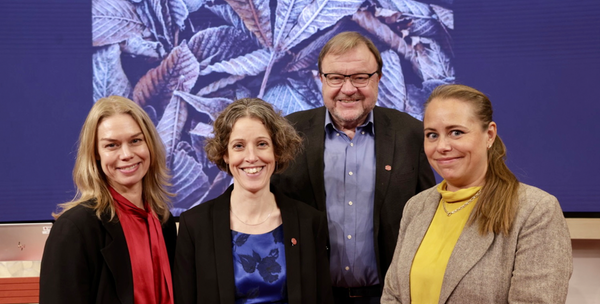
Caption: A Christmas greeting from the program management. Christina Kullberg,Professor at the Department of Modern Languages, Program director Linda Wedlin, Professor at the Department of Business Studies; Dag Blanck, Professor at the Department of English and Patricia Mindus, Professor at the Department of Philosophy. Photo: Mikael Wallerstedt
There are still a few days to go before Christmas is here, but it's time to wrap up this semester and set our minds on other things, such as christmas candy and relaxation to recharge our batteries. We have held the second seminar in our biweekly series, in the TLS at Carolina Rediviva, where Johan Boberg and Shirin Ahlbäck-Öberg gave us a very interesting review of the evolution of university democracy over the past half-century. We also learned more about the electoral system, representation, and views on collegiality at Swedish universities. Highly educational and very exciting! After Christmas, we look forward to new seminars and further discussions; on the role of literature in democracy, on feminism, expert roles and legal principles, and much more. But first, some well-deserved rest!
If you have not already done so, you might like to read Anders Ekström's (DN Debatt 2022-12-04) very thought-provoking reflections on the interconnection between the forms and institutions of science and those of democracy, and on universities as "struggling democracies". Read and ponder, and we'll hear and see you again in the new year!
Anders Ekström: Universiteten måste bli kämpande demokratier (DN website, in Swedish)
We wish you all Happy Holidays!
Program management team Democracy and higher education
November 2022: This time of year!
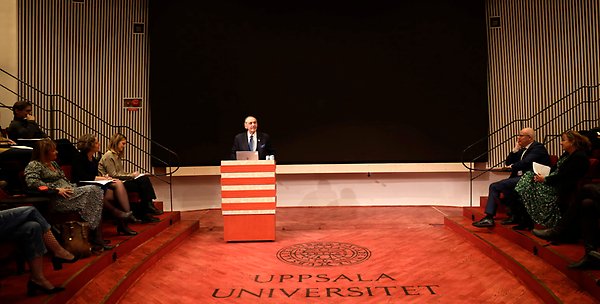
Jan Eliasson speaks in the Humanistic theater.
Autumn is in full swing and we have celebrated the first of Advent as well as experienced the first snowfall of the season! Unfortunately, the latter happened to arrive just in time for the opening of the research program, which meant that some didn't manage to get to Uppsala as planned. But many did, and those of us who were here were able to enjoy a most inspiring afternoon in the Humanities Theatre. After engaging introductions by both the Rector and Vice-Rector, we were treated to a thought-provoking history of the relationship between education and democracy, through collectivism and individualism, by Li Bennich-Björkman and an outlook to the world's challenges and insight into how democratic work in international bodies can - sometimes - work through Jan Eliasson's inspiring reflections from the United Nations. We also enjoyed the wise reflections on the importance of knowledge and science in public debate through Farshid Jalalvand's lively and precise analysis of the threats to academic freedom that come both from within the academy and from outside. In the latter part of the afternoon, we gained insight into ongoing research within the program, both through the project leaders and with the help of our researchers Johan Boberg, Annekatrin Deglow, Gunilla Lindqvist and PerOla Öberg, on themes such as the form and function of university democracy, the role of higher education for democracy in newly developed democracies, the democratic mission of the Language Workshop at the university, and the struggle between academic autonomy and the primacy of popular freedom in the governance of contemporary research. Many thanks to all participants and to our engaged audience!
With this opening session behind us, it is with good spirit that we take on the challenges ahead. Our coming activities are inspiring as well, starting with Johan Boberg's seminar on “The rise of University Democracy” on December 6th at 1pm-3pm in the TLS at Carolina Rediviva. Welcome! For the program's researchers, there will be an end of semester meeting on December 20th in the afternoon, before we take a short Holiday break. We will be back in action on January 24th, with the postponed seminar on the Democratic Dilemmas of Digitisation and Data management in science. It will be held from 13-16.
We also have some exciting events planned for the spring. One is a mini-symposium on the Role of the Expert in Democratic Governance, and another is that we will host an event during the Uppsala Literature Festival, both to be held in March. We will get back to you with exact dates and times for these events. We continue to encourage you to contact any of us if you have suggestions for themes, seminars or guests that you would like the program to engage with and which relate to the relationship between democracy and higher education.
If you haven't already seen it, we have now announced the 8 new researchers who received funding in the last call for proposals for the program. We are delighted to welcome Annekatrin Deglow, department of peace and conflict research; Jakob Evertsson, department of history; Ida Lidegran, Gunilla Lindqvist, Thomas Nygren, Maria Rasmusson, and Malin Tväråna, all from the department of education; and PerOla Öberg, department of government. Congratulations, and welcome!
We would also like to take this opportunity to congratulate Solveig Jülich, Christine Ekholst, and Anders Themnér on successful grant applications for VR. While these are separate research applications, they are variously connected with the projects these researchers are conducting under the Democracy and Higher Education program. Congratulations! And for those of you who did not receive funding, we again encourage you to apply for the "Nearly-there-funding" that we announce, and where you apply based on the existing application and the assessment you received from VR/RJ/other funder. Apply now!
Best wishes for Advent!
/Linda
October 2022: Shorter days, rays of sunlight, and we are just waiting…
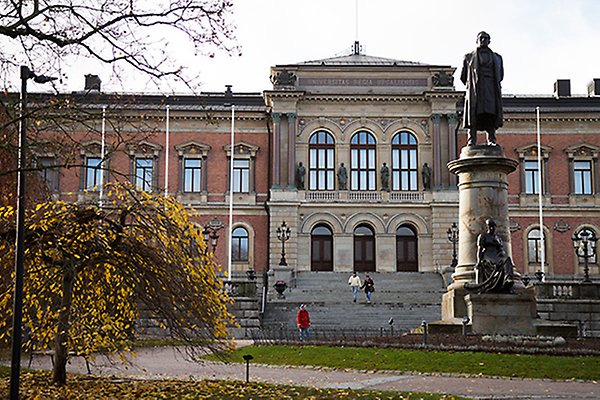
The university building in autumn color.
What happened to October? It just seems to have disappeared, along with the coming of fall with its shorter days and less sunlight. Now begins the long wait for spring. Well, not quite. There are great moments of sunshine also in the fall, and in October we have seen the inauguration of no less than two research centers at Uppsala University with interest to democracy and higher education. The first is the inauguration of HERO, the research center focusing on Higher Education as a Research Object, placed at the department for the history of ideas. Research on the organising and governance of higher education is on their agenda, and at the inauguration we also learned about their commissioned work on the challenges to higher education caused by the recent pandemic, including its effects on participation, legal certainty and skills development for various student groups. We also learned to separate institutional autonomy from individual freedoms and rights of individual academics. At the second inauguration, of the Alva Myrdal Center for Nuclear Disarmament, we learned plenty about the important work going on in various democratic for global disarmament, and the importance of academic research and research-based knowledge for such work. Particularly encouraging to hear representatives of both the UN and the Nobel peace-prize recipient of 2017, ICAN, stress the need for independent and trusted science in their policy work. Academic freedom is, it seems, a topic salient in many contexts and situations.
Speaking of inauguration, our own is drawing near: November 21st, 13-17 in the Humanities Theatre. If you have not already registered, please do so. Don’t miss the chance to hear Li Bennich Björkman and Jan Eliasson reflect on “Universities and democracy: How can we contribute?”, meet our project leaders, and hear some of our researchers present their research in our “researcher relay”.
You have a chance to meet one of our researchers already on November 8th, 13-15, in TLS at Carolina Rediviva. The research program will host its first seminar and Janne Holmén will present his project ”Toppuniversitetens finansiering och styrformer”. You can also read an interview with Janne on our webpage.
The following seminar in our series will be held on December 6th, 13-15 also in TLS, when Johan Boberg will present his project on “Universitetsdemokratins uppkomst”. Seminars are open to all and no registration is needed. Come and join the discussion!
For many academics the fall entails waiting…waiting for the results of the hard work put into funding applications earlier in the year. If you get negative outcomes – don’t dismay! Note instead that Democracy and Higher education has two separate calls open. The “nearly-there” funding is for those of you that receive positive evaluations but no money from external funding agencies: You can apply to us for support to revise the application for the next round. These applications are evaluated continuously by the program management team, and for applications coming to us before December 1, we will give you a decision within two weeks. For those instead wanting to apply directly to us for support in terms of time for research, the deadline for applications is January 31st. Decisions will come in March.
And for those of you waiting for our own decisions on the second funding call, the wait will be over shortly. The new researchers will be announced on our webpage very soon!
Fall greetings,
Linda
September 2022: Celebrations and new opportunities
Election day – a celebratory day for democracy – has passed. Yet, we still know very little of that this means for how Sweden will be governed in the coming four years. But, as is always the case, a few rounds of coffee and biscuits with the chairman of the Riksdag will resolve that, and we will have a new government in place. What that means, in turn, for the governance and work of universities and higher education organisations will likely be an issue for discussion in academic circles in the coming weeks. Just in time for the international Day of Democracy, September 15th, we witness yet another important marker for democratic systems, namely the peaceful handing over of power. The sitting government willingly resigns, and the prime minister elect gets ready to pick up the reigns and form a new government. Both sides are all too aware that these positions do not last forever. In democracies, we all get another chance and with that, new opportunities open for both winners and losers.
The research program also offers new opportunities. We are currently evaluating research proposals from our second call, and we expect to announce a new set of researchers and their projects joining the program at the end of October. This time, our evaluation committee consists of five excellent researchers from different faculties within UU. We look forward to see the development of many exciting research projects and lots of new activities to fill our calendars!
The researchers we admitted in the first call are starting their projects, and we look forward to hear Janne Holmén talk about his project ”Toppuniversitetens finansiering och styrformer”, on November 8 at 13.15 – 15. About one month later, on December 6 the same time, Johan Boberg will present his project “Universitetsdemokratins uppkomst”. Don’t miss out! Keep an eye on the webpage for place. No registration needed!
On the webpage you will now find excellent short films where our project leaders Patricia, Dag and Christina present themselves and talk about their respective thematic areas. Do watch these! They are short but very informative! During the fall we will also present our new researchers in the program and they will be given a chance to talk about their planned research.
A celebratory day for the research program will be November 21 where the inaugural ceremony awaits. The program is under development, and I urge you to reserve the afternoon for exciting and inspiring talks and discussions. We will be in the Humanities Theatre – “an arena for limitless dialogue”. Isn’t that just what democracy needs?
Let me also inform you that our announced seminar on “Democratic dilemmas of Digitalisation and datafication”, originally planned for October 4, will be moved to January. More information will follow.
Do you want to present your research related to democracy and higher education at one of our seminars? Please inform of us on dohu@uu.se. Seminars will be held Tuesday afternoons (odd week numbers) at 13-15.
I hope to see many of you there!
/Linda
Program director Democracy and Higher Education
August 2022: Summer feeling and new adventures ahead
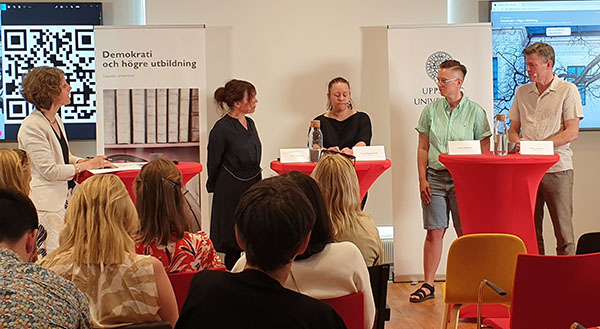
New term awaiting! While hoping that the summer feeling will stay with us for a little while still, it is time to resume our thoughts from before the holidays – where did we leave off? For me, the last work week before summer was an interesting and intense week in Almedalen, Gotland. The terrible attack on one of the participants put an abrupt end to the joy and good spirits characterising the events throughout Visby, but before that, constructive conversations and debate seemed to be thriving. For me, I had the opportunity to hear the minister of education reflect insightfully about academic freedom, listen to vice-chancellor Anders Hagfeldt speak about Sweden as an excellent research nation, listen to the role of public service media in times of crises, and – not least – lead a very interesting discussion about democracy, knowledge and climate change with Sofia Näsström, Lovisa Håkansson, Maria Wetterstrand and Mikael Karlsson. With the starting point that not only can we manage the climate crises with democratic means, we indeed need democratic processes and procedures to do so. We were given a great deal of optimism, but also a warning: all need to play their parts in democratic governance. This serves us an opportunity to rethink our role as universities, as researchers and as teachers – what do we need to do to play our part, and what do we need to give our students and the public for them to be able to play their role as proper citizens and voters in a democratic system for a sustainable future?
The events in Visby, both the good and the bad, make salient the continued need for critical reflection, open discussion, and democratic dialogues for our society. The research program aims to be present in the important conversations of times regarding the relation between democracy and higher education. Questions about what constitutes this relation and what it means shall be explored. Exactly what questions will be explored is up to you to decide! Whether you have an ongoing research project, ideas or thoughts about future projects, or are just curious about a topic or an issue – please let us know! We are grateful for suggestions for themes, seminars, guests, or discussions that you see as important and timely, and where you think the research program should have a voice. Please feel free to contact one of the project leaders or send an e-mail to dohu@uu.se.
We begin the fall with an open lecture on August 25, at 15.15 – 17, with professor Roderick Ferguson, Yale university. The title of his talk is ”Progressive Social Movements and the Cultures of Possibility”. After the talk there will be a mingle and a chance to meet with other program researchers. The next planned event will be a seminar on “Digitaliseringens och datafieringens demokratiska dilemman” together with ABM, on October 4, at 13.15 – 16. More details will come. While you are in your calendars, please make note of the November 21, from 13 onwards, for the inauguration of the research program. The vice-chancellor and others will speak, followed by an academic program until about 17.30. More information will come also on this!
After the first round of calls in the spring, we are happy to welcome eight researchers to the program: Janne Holmén (Department of Education), Johan Boberg (Department of Education), Annika Nilsson (Department of Law), Christine Ekholst (Department of History), Solveig Jülich (Department of History of Science and Ideas), Johanna Ohlsson (IRES), Anders Themnér (Department of Peace and Conflict Research), and Emma Clery (Department of English). The researchers and their projects will be further presented during the fall, as they begin their research. If you are curious you can already now see the titles of their projects on the webpage.
Speaking of calls, the deadline for our second round of calls is August 29.
Looking forward to an exciting fall semester!
/Linda
Program director Democracy and Higher Education
June 2022
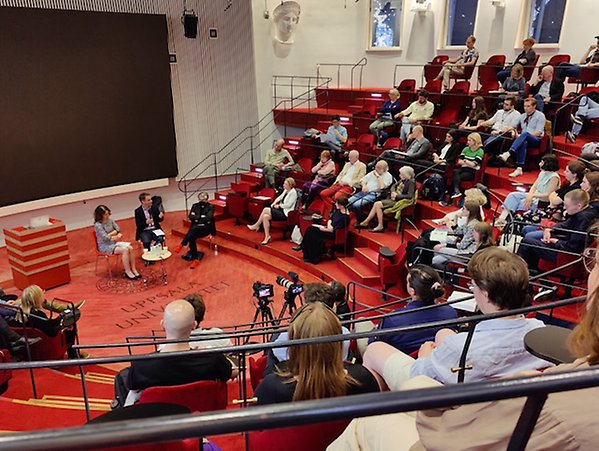
Panel discussion on "Democracy under duress" in the Humanities Theatre.
Over the past few weeks it has occurred to me, in different ways and in different contexts, that things very near us are about to, or have already, significantly changed. During the panel discussion in the Humanities theatre a couple of weeks ago, Sofia Näsström and her guests discussed the state of democracy in the world noting specifically that it has dramatically declined over the past 10-15 years. Under the heading “Democracy under duress”, interesting questions were raised as to the causes and consequences of this duress. In the same venue a few weeks earlier, I attended a conference on the internationalisation of higher education and universities. A similar realisation hit me: after decades of expansion with a clear political agenda to increase internationalisation of higher education, we now need to revisit these strategies in view of the challenges to democracy posed by internationalisation which include social inclusion problems, equity, and the geopolitical implications of international collaboration. Issues such as these are not only of concern in relation to current national security since the pandemic and the climate crisis also draw attention to them.
In both these discussions, it became clear how questions regarding higher education, the role of the university and academia are entangled with broader democratic developments, principles and processes. While these questions were raised on both these occasions, few answers were provided as to how the relationship between democracy and higher education should be understood. Why? Because relatively little research has explicitly and intentionally explored those relations. Luckily, however, this is the task for the research program Democracy and Higher Education.
In fact, we started looking into this in a seminar specifically addressing the interrelation between democratic ideals and practices together with international higher education and research. On April 4, in response to the call from the minister of higher education to stop all research and teaching collaborations with Russian and Belarusian research institutions, we held a hybrid seminar on the issue of academic boycotts. With speakers sharing experiences from Russia but also from other contexts, including Israel and South Africa, we discussed the democratic – as well as the ethical and moral – dilemmas of boycotts, and how to understand those in the present as well as historically. This was an excellent start to our program, getting straight to timely, central and rather critical questions about the role, responsibility and functioning of higher education and research in times of crisis. The way this has begun seems to have opened a Pandora’s box and we plan for a continuation of these discussions during the fall.
Also in the fall, the program will take on other timely and difficult questions relating to democracy and higher education. Already on August 25 – make note of the date in your calendars! – we have invited Roderick Ferguson, professor of Women's, Gender, and Sexuality Studies as well as American Studies at Yale University, to give a lecture and workshop on the topic of student protests. He is the author of several books including We Demand: The University and Student Protests. Somewhat later in the fall, we will host a seminar on the democratic dilemmas of digitalisation, specifically discussing the digitalisation of research material. This will be organised together with researchers at the department of ABM. There will also be a formal “launch” of the research program during the fall, so keep an eye out for when we set the date. But we have already scheduled for July 5th our Almedalen seminar, “What knowledge and what democracy is needed to successfully combat climate change?”. If you are not elbowing your way around Visby at this time, the seminar will be live-streamed and thus it will be possible to join from your beach towel or lounge chair should you wish!
At this very moment, we are in the process of making decisions on our first call for research support within the program. Nineteen applications are under review with our expert panel of six researchers. Decisions will be announced before Midsummer and researchers can thus start their work from September 1st. For those of you who do not receive funding this time, or if you did not make the short deadline in this round of calls, I am happy to announce a new chance to apply very, very, soon. This will be directly after Midsummer in fact. So please be patient for a little while longer. The call will be open all summer with a deadline in late August. Keep an eye on our website as more information will follow up there shortly.
Speaking of the website – Uu.se/dahe – do keep an eye on it! All information relevant to the program will be posted there. There you will also find this newsletter, posted monthly, and soon you will also be able to see short interviews with our project leaders – Patricia, Dag and Christina – and learn more about them, their research, and the research themes they are leading within the program. Please also help us to spread word of the webpage in your networks! It will also be possible to sign up to our e-mail list to get information directly to your inbox.
With this letter I want to take the opportunity to welcome you to the program. Or does that even make sense with a research program? After all, you, our researchers, are already here and many of you are already working on issues relating to our theme. In that sense, we are not creating something anew. But we do want to welcome you into what we hope will be a new setting and a community within communities. I and the project leaders look forward to working with you in doing and promoting interesting, important and relevant research within the themes of the program, and to taking part in exciting and enlightening discussions and debates, and to helping foster an academic “self enquiry” on issues relating to the complex relations between democracy and higher education. We hope many of you will join us!
Best wishes for a warm, restful and pleasant summer!
Linda
Program director Democracy and Higher Education
